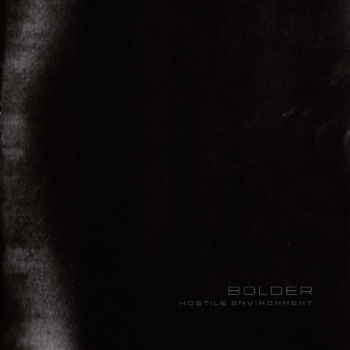It takes two to tango. Two, because a Hostile Environment isn’t merely a space where I’m subject to threats and dangers, but where I conceive such initially undefined objects as “threats” and as “dangers,” where I harbor the trauma of damage to my person and allow it to reframe itself around even the most innocent of articles and figures, and ultimately around my reactions and actions. Because that’s what trauma essentially is, not specifically an instance of pain or injury, but an exorbitant, all-consuming takeover of my outlook on things, an encroachment into the foundations of my perception and psychology. It’s this inordinate weight that makes it so pernicious, and it’s this same weight, this same swallowing of positivity into an interiorized sewer of cynicism and hostility that Bolder reconstruct on their debut long player.
I say “reconstruct,” but it’s no less likely that the Berlin duo of Peter Votava (a.k.a. Pure) and Martin Maischein (a.k.a. Heinrich at Hart) are exaggerating enmity to ever greater depths with the lightless post-dubstep-industrial-ambient-techno cheeriness they summon on Hostile Environment. And just as it’s difficult to say which hand is responsible for which subsonic plunge of bass, which gliding haunt of suspicion and which coalface of programmed dissonance, it’s a tall order prising apart the bile of the outside world from that of the inner. If “Sinking Cities” has any bearing on this question, the primary source of the album’s detached animosity is the self, with the insistent paranoia of its tapped percussion and the orbit of desolate keys transmitting the internal cycle of scorn, ridicule, and persecution that festers noxiously inside us as we trudge from one corner of an anonymous city to another.
This assumption solidifies with the subsequent coasts through electronic anxiety and urbanized alienation, with each track coming across not so much as an unadulterated, unedited bout through the external world’s aggression in all its erratic absurdity, but as a methodically organized set of phenomenological abstractions, as circuits of toxic emotion that have been collated, honed, and systematized over weeks, months, and years of personal recapitulation and relapse. Corteges like “Morbid Funk Ride” and “Passive Aggressive” are idealizations more than anything else, their closed focus on repeated dispersions of buzzing synth and juddering electro-squeals provoking the impression of someone for whom “hostility” has ceased being a phenomenon to be encountered haphazardly amidst the less unpleasant experiences the universe has to offer, and is now instead their habitual mode of being-in-the-world, a readymade filter of experience that irrevocably pollutes everything and that finds expression in the sweeps of transmitter interference that open “Passive Aggressive” and the song’s laxative bass line that pulls us around an ever-narrowing circle of mealy disconnection.
Having said this, Maischein and Votava do launch the occasional attempt to vacate themselves from their self-imposed confines, or at least they do with “Deep Cuts,” an album highlight defined by an eighth-note, quasi-keyboarded melodic underpinning that actually emotes with an estranged variation of humanity and optimistic remembrance. However, its discolored synthetics are gradually complemented and than effaced altogether by the looming of throaty metallo-chords, which in contrast to the relative lightness of their overture provide Hostile Environment with perhaps its most enduring moment and image, an image of how negative events seemingly have much more of a command over the human mind than their positive counterparts.
Or maybe it’s just the case that, for Bolder, the Hostile Environment has become such an ingrained way of life, has become so embedded in their conditioned selves that even when they consciously try to entertain a healthier orientation, they find that noxious, pessimistic thoughts and emotions inevitably reassert themselves, peaking out in the oscillating noise and echoing clicks of “Extraterrestrial Deactivity.” Or maybe they just want to drag the rest of us down with them, overstating the extent of the world’s evangelical cannibalism in pieces like “Residuality,” where once again an initial stretch of diffuse textures coalesce into jarring swells of analog discordance, and where this unremitting dereliction possibly functions to justify the only approach to life some are capable of maintaining.
And, in fact, residuality is a fitting concept to end this whole aside with, since the LP realizes a planet where the interiority of the individual is a concentrated residue of the instances of uncertainty, strife, and pain he or she has shaken hands with over the course of a life. The album condenses these episodes into pseudo-endless itineraries of industrio-dub, of mobile static that fuses from one intimidating manifestation of an underlying malice to another. And for all its perverse refinement, we should take care not to let it suck us in too far. Because a truly Hostile Environment requires our complicity.
More about: Bolder

